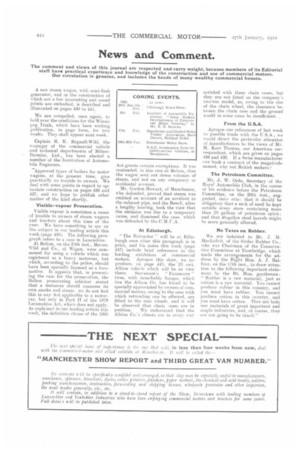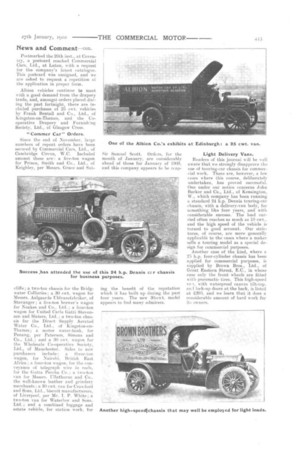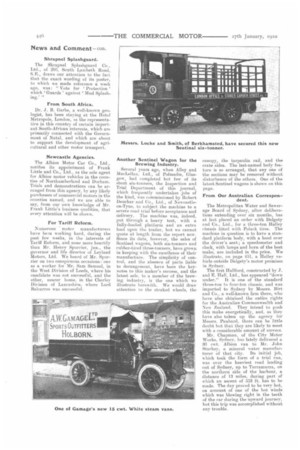News and Comment.
Page 10

Page 11

Page 12

If you've noticed an error in this article please click here to report it so we can fix it.
The comment and views of this journal are respected and carry weight, because members of its Editorial staff have practical experience and knowledge of the construction and use of commercial motors. Our circulation is genuine, and includes the heads of many wealthy commercial houses.
A new steam wagon, with semi-flash generator, and in the construction of which not a few interesting and sound points are embodied, is described and illustrated on pages 439 to 441.
We are compelled, once again, to hold over the conditions for the 'Winnipeg Trials, which have been waiting publication, in page form, for two weeks. They shall appear next week.
Captain R. IC. Bagnall-Wild, the manager of the commercial vehicle .and technical departments of MilnesDaimler, Ltd., has been elected a member of the Institution of Automo.hile Engineers.
—Approved types of boilers for motor wagons, at the present time, give practically no trouble to owners. We deal with some points in regard to upto-date construction on pages 43 and 437, and we hope to publish other matter of the kind shortly.
Visible-vapour Prosecution.
Visible vapour is sometimes a cause of trouble to owners of steam wagons and tractors about this time of the year. We have something to say on the subject in our leading article this week (page 435). The following paragraph refers to a case in Lancashire.
At Bolton, on the 2.3th inst., Messrs. Wild and Co., of 'Wigan, were summoned for using a vehicle which was registered as a heavy motorcar, but which, according to the police, should have been specially licensed as a locomotive. It appears that, in presenting the case for the prosecution, the Bolton prosecuting solicitor stated that a motorcar should consume its own smoke and steno,. we do not find this in any Act applicable to a motorcar, but only in Part H of the 1878 T.ocomotive Act, which does not apply. As explained in our leading article this week, the definition clause of the 1896 Act grants certain exemptions. it was contended, in this ease at Bolton, that the wagon sent out dense volumes of steam, and not on any temporary or accidental account.
Mr. Gordon Hewart, of Manchester, who defended, proved that steam was emitted on account of an accident to the exhaust pipe, and the Bench, after a lengthy hearing, took the view that the emissiou was due to a temporary cause, and dismissed the case, which was defended bv the C.M.F.A.
At Edinburgh.
" The Extractor " will be at Edinburgh soon after this paragraph is in print, and his notes this week (page 447) include brief references to the leading exhibitors of commercial motors. Apropos this show, we reproduce, on page 44r.). the 25 cwt. Albion vehicle which will be on view
there. Stevenson's " laransure " tires, with detaehable flanges. which tire the Albion Co. has found to be specially appreciated by owners of commercial motors, owing to the ease with which retreading can he effected, are fitted to the rear wheels, and it will he observed that chain oases are in position. We understand that the Albion Co.'s clients are in every way
satisfied with these chain cases. hut they are not fitted on the company's two-ton model, as, owing to the size of the chain wheel, the clearance between the chain case and the ground would in some cases be insufficient. ,
From the U.S.A.
Apropos our references of last week to possible trade with the U.S.A., we would direct the particular attention of manufacturers to the views of Mr. H. Kerr Thomas, our American correspondent, which are given on pages 438 and 439. If a Swiss manufacturer can book a contract of the magnitude named, why not British makers.?
The Petroleum Committee.
Mr. J. W. Orde, Secretary of the Royal Automobile Club, in the course of his evidence before the Petroleum Committee, on the 20th inst., suggested, inter Witt : that it should he obligatory that a sack of sand be kept outside every store containing more than 20 gallons of petroleum spirit; and that 40-gallon steel barrels might be more generally allowed.
No Taxes on Rubber.
We are indebted to Mr. .T. M. MacLidieb, of the Sirdar Rubber Co., nho was Chairman of the Conservative Committee at Trowbridge, which .made the arrangements for the address by the Right Hon. A. J. Balfour, on the 17th inst., to draw attention to the following important statement by the Rt. Hon. gentleman; " Rubber is a raw material, just as cotton is a raw material. You cannot produce rubber in this country, and von must have rubber. You cannot produce cotton in this country, and von must have cotton. They are both raw materials of great important and staple industries, and, of course, they are not, going to be taxed." Postmarked the 20th inst., at Coventry, a postcard reached Commercial Cars, Ltd., at Luton, with a request for the company's latest catalogue. This postcard was unsigned, and we are asked to request a repetition of the application in proper form.
Albion vehicles continue to meet with a good demand from the drapery trade, and, amongst orders placed during the past fortnight, there are included purchases of 25 cwt. vehicles by Frank Bente-11 and Cu., Ltd., of Kingston-on-Thames, and the Cooperative Drapery and FurnishEng Society, Ltd., of Glasgow Cross.
"Commer Car" Orders.
Since the end of November. large numbers of repeat orders have been secured by Commercial Cars, Ltd., of Cambridge Circus, W.C. Included amonst these are : a five-ton wagon for Prince, Smith and Co., Ltd., of Keighley, per Messrs. Grace and Silt
di& ; a two-ton chassis for the Bridgwater Collieries; a 30 cwt. wagon for Messrs. Aalgaarde Eldvarefahriker, of Stavanger ; a five-ton brewer's wagon for Noakes and Co.. Ltd.; a four-ton wagon for United Carlo Gatti Stevenson and Slaters, Ltd. ; a two-ton chassis for the Direct Supply Aerated Water Co., Ltd., of Kingston-onThames; a motor water-tank, for Penang, per Paterson, Simons and Co., Ltd.; and a 30 cwt. ‘vagon for the Wholesale Co-operative Society, Ltd., of Manchester. Sales to new purchasers include: a three-ton wagon, for Nairobi, British East Africa ;a four-ton wagon, for the conveyance of telegraph wire in reels, for the Gutta Percha Co. ;a two-ton van for Messrs. Ellathorne and Co., the well-known leather and grindery merchants ; a 30 cwt. van for Crawford and Sons, Ltd., biscuit manufacturers, of Liverpool, per Mr. T. P. White ; two-ton van for Waterlow and Sons. Ltd.; and a combined luggage and estate vehicle, for station work, for
Sir Samuel Scott. Ordurs, for the month of January, are considerably ahead of those for January of 1909, and this company appears to be lap ing the benefit of the reputation which it has built up during the past four years. The new 30-ewt. model appears to find many admirers. Light Delivery Vans.
Readers of this journal will be well aware that we strongly disapprove the use of touring-car chassis for commercial work. There are, however, a few cases where this course, deliberately undertaken, has proved successful. (Inc under our notice concerns John Barker and Co., Ltd., of Kensington, W., which company has been running a standard 24 h.p. Dennis touring-car chassis, with a delivery-van body, for something like four years, and with considerable success. The load carried often reaches as much as 10 cwt.. and the high speed of the vehicle is turned to good account. Our strictures, of course, are more generally applicable to the cases where a maker sells a touring model as a special design for commercial purposes.
Another case of the kind, where a 23 h.p. four-cylinder chassis has been applied for commercial purposes, is supplied by Brown Bros., Ltd., of Great Eastern Street, E.C., in whose case only the front wheels are fitted with pneumatic tires. This high-speed val. with waterproof canvas tilt-top. an:I lock-up doors at the back, is listed at C395. and we learn that it does a considerable amount of hard work for its owners.
Shrapnel Splashguard.
The Shrapnel Splashguard Co., Ltd., of 266, South Lambeth Road, SE., draws our attention to the fact that the exact wording of its poster, to which we made reference a week ago, was: " Vote for Protection which Guards ' against Mud Splashing.'" From South Africa.
Dr. J. B. Garbe, a well-known geologist, has been staying at the Hotel Metropole, London, as the representative in this country of certain important South-African interests, which are primarily connected with the Government of Natal, and which are about to support the development of agricultural and other motor transport.
Newcastle Agencies.
The Albion Motor Car Co., Ltd., notifies its appointment of Frank Little and Co., Ltd., as the sole agent for Albion motor vehicles in the counties of Northumberland and Durham. Trials and demonstrations can be arranged from this agency, by any likely purchasers of commercial motors in the counties named, and we are able to say, from our own knowledge of Mr. Frank Little's business qualities, that every attention will be shown.
For Tariff Reform.
Numerous motor manufaeturers have been working hard, during the past few weeks, in the interests of Tariff Reform, and none more heartily than Mr. Henry Spurrier, jun., the governor and life director of Leyland Motors, Ltd. We heard of Mr. Spurrier on two conspicuous occasions: one as a worker for Mr. Sam Samuel, in the West Division of Leeds, where his candidate was not successful, and the other, nearer home, in the Charley Division of Lancashire, where Lord Balcarres was suceessf
Another Sentinel Wagon for the Brewing Industry.
Several years ago, when Alley and MacLellan. Ltd., of Polmridie, Glasgow, had completed but few of its stout six-tonners, the Inspection and Trial Department of this journal, which frequently undertakes jobs of the kind, was commissioned by Robert Dandier and Co., Ltd., of Newcastleon-Tyne, to subject the machine to a severe road trial before acceptance and delivery. The machine was, indeed, put through a heavy test, with a fully-loaded platform and an extra load upon the trailer, but we cannot quote at length from the report now. Since its date, however, the sales of Sentinel wagons, both six-tanners and rubber-tired three-tonners, have grown in keeping with the excellence of their manufacture. The simplicity of control, and the absence of parts liable to derangement, have been the keynotes to this maker's success, and the latest sale, to a member of the brewing industry, is the one which we illustrate herewith. We would draw attention to the straked wheels, the canopy, the tarpaulin rail, and the crate sides. The last-named body feature is so arranged, that any one of the sections may be removed without disturbance of the others. One of the latest Sentinel wagons is shown on this page.
From Our Australian Correspon dent.
The Metropolitan Water and Sewerage Board of Sydney, after deliberations extending over six months, has at last placed an order with Dalgety and Co., Ltd., for a three-ton Halley chassis fitted with Polack tires. The machine in question is to have a standard platform body, with a hood over the driver's seat; a speedometer and clock, with lamps and horn of the best make, are included in the price. We illustrate, on page 951, a Halley vehicle outside Dalgety'e motor premises in Sydney. The first Hanford, constructed by J. and E. Hall, Ltd., has appeared "down under." it is one of the standard three-ton to four-ton chassis, and was imported to Sydney by Messrs. Birt and Co., a well-known firm there, who have also obtained the entire rights for the Australian Commonwealth and New Zealand. They intend to push this make energetically, and, as they have also talcen up the agency for Messrs. Panhard, there can be little doubt but that they are likely to meet with a considerable amount of success.
Mr. Chapman, of the City Motor Works, Sydney, has lately delivered a 30 cwt. Albion van to Mr. John Starkey, a mineral water manufac turer of that city. Its initial job, which took the form of a trial run, was over the heaviest road leading out of Sydney, up to Turramurra, on the northern side of the harbour, a distance of 13 miles, during part of which an ascent of 553 ft. has to he made. The day proved to be very hot, on account of one of the hot winds which was blowing right in the teeth of the car during the upward journey, but this trip was accomplished without any trouble.




















